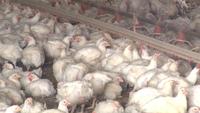MARYLAND - The Maryland Department of Agriculture is urging poultry and dairy cattle farmers to stay vigilant as detections of Highly Pathogenic Avian Influenza, or bird flu, continue to rise.
According to the Department, bird flu was first detected in poultry in 2022 and has also been confirmed in dairy cattle, increasing the risk of infection between cattle herds and poultry flocks. In the past month, the Department of Agriculture says there have been 90 confirmed detections of the virus in poultry flocks and 339 in cattle herds, though none have been in Maryland.
The announcement follows the first person in the United States to experience severe illness caused by the virus.
Due to the rise in cases, Maryland officials are recommending keeping poultry indoors. Producers are asked to weigh the risk to their poultry before allowing outdoor access. The Department is expected to revisit the situation again in April 2025 for further guidance.
“Maryland poultry farms and dairy farms should remain on high alert for HPAI infections in both poultry flocks and dairy cattle herds,” said Maryland Department of Agriculture Secretary Kevin Atticks. “Home to many mixed species farms, we are urging Maryland farmers to be mindful of comingling poultry with dairy cattle and to increase biosecurity measures on all farms with poultry or dairy cattle.”
The Department of Agriculture offered the following tips for farmers to reduce risk of bird flu exposure:
-Restrict access to poultry and livestock by posting “Restricted Access” signage, securing the area with a gate, or both.
-Take steps to ensure that contaminated materials on the ground are not transported into the poultry growing house or livestock area.
-Provide the following items to anyone entering or leaving any area where poultry and cattle are kept:
-Footbaths and foot mats with disinfectant;
-Boot washing and disinfectant station;
-Footwear change or foot covers.
-Cover and secure feed to prevent wild birds, rodents or other animals from accessing it.
-Cover and properly contain carcasses, used litter, or other disease-containing organic materials to prevent wild birds, rodents or other animals from accessing them and to keep them from being blown around by wind.
-Allow MDA to enter the premises during normal working hours to inspect your biosecurity and sanitation practices.
-Report any unusual bird deaths or sudden increases in very sick birds or dairy cattle to the department’s Animal Health Program at 410-841-5810 or after-hours to 410-841-5971. Also contact the USDA at 866-536-7593.
-Read up about HPAI and biosecurity measures on the Animal Health website.



